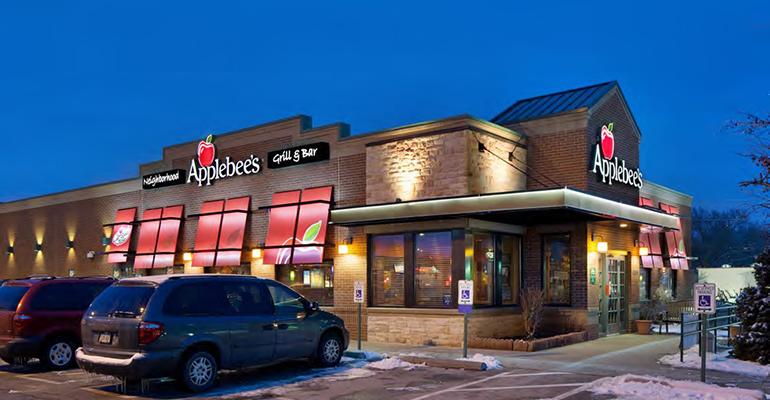DineEquity Inc. expects Applebee’s Neighborhood Grill & Bar franchisees to close slightly more restaurants this year than in 2016, the company said Wednesday.
“Our 2017 plan includes expectations for the closure of some Applebee’s restaurants,” said Greggory Kalvin, who on Wednesday was named DineEquity’s interim chief financial officer.
“We currently anticipate closing 40 to 60 restaurants, the midpoint which is slightly above 2016 levels,” Kalvin said on a call with analysts. Applebee’s closed 46 restaurants and opened 29 in 2016, bringing its total to 2,016 units for the fourth quarter ended Dec. 31
Richard Dahl, DineEquity chairman and interim CEO, said the Glendale, Calif.-based parent company, which also owns the IHOP family-dining brand, would work with Applebee’s franchisees on financial reviews to improve efficiencies and profitability.
“In limited cases, where assistance may be necessary, we stand ready to provide support to our franchisees,” Dahl said, which he said might include shuttering some units.
“We believe clearly that restaurant closures are an important tool to preserving the financial health of the system,” he said.
Kalvin said Applebee’s anticipates 20 to 30 restaurant openings, the majority of which will be international.
Dahl said the casual-dining segment in particular was hit by declines in retail foot traffic in 2016, especially at the December holidays, as well as consumer trends toward dining at home and purchasing prepared foods from groceries.
The company said Applebee's domestic same-store sales declined 7.2 percent in the fourth quarter and IHOP's same-store sales declined 2.1 percent in the period.
DineEquity’s fourth-quarter net income fell 15.8 percent, to $21.3 million, or $1.18 a share, from $25.4 million, or $1.35 a share, in the prior-year quarter. Revenue was down 10 percent, to $154.2 million from $171.3 in the same quarter last year.
“These are challenging times for the restaurant space and we continue to invest in our brands to improve performance,” Dahl said.
Dahl said Applebee’s hand-cut, wood-grilled platform, introduced in May 2016, “clearly did not resonate with our guest,” adding that the industry is seeing value-focused consumer trends.
Investments to stabilize Applebee’s same-store sales declines, which the company in guidance said would range between down 4 percent and 8 percent this year, would include research into culinary, testing and marketing, Dahl said.
“We must use a robust testing methodology that better meets the ever-changing needs of our guests,” he said. Applebee’s “back-to-basics approach” would also include the acceleration of off-premise channels, growth in the bar and beverage business and improved technology.
Dahl said Applebee’s marketing strategy will include a new advertising agency and more personalized messaging to customers through email and social channels.
He said DineEquity is spending $10 million in the use of outside services to evaluate its strategy and chart a better course for new products and marketing.
The family-dining IHOP brand weathered 2016 with full-year same-store sales that were basically flat, down 0.1 percent for the year.
Darren Rebelez, president of DineEquity’s 1,733-unit IHOP division, told analysts that while same-store sales were up 4.3 percent over a two-year span, “IHOP was not immune to the challenges facing the entire industry.
The IHOP brand is looking at non-traditional sites, opening seven new ones in 2016, as well as its Rise and Shine remodeling program, which saw 300 renovations in last year. Another 300 remodels are expected this year, Rebelez said.
“Enhancing the guest experience is not limited to the four walls of the restaurant,” he told analysts. “We believe that expanding our off-premise business will not only make IHOP more accessible to our guests but create an additional sales channel.”
IHOP is beta-testing a meals-to-go program, which includes proprietary packaging technology and online ordering, he said. The packaging, in development for more than a year, is designed to “protect the integrity of our unique breakfast food,” Rebelez said.
Dahl said DineEquity is prioritizing the hiring of a new Applebee’s division president while it also searches for a new CEO to replace Julia Stewart, who resigned in February and participated in her last DineEquity earnings call on Wednesday.
“There has been an ongoing search for an Applebee’s president,” Dahl said, adding that the company was very close to hiring for that position.
“The urgency truly of having an Applebee’s president overrides the necessity of the CEO search being placed ahead of that,” he said.
Several analysts on Wednesday lowered their targets for DineEquity shares.
Mark Kalinowski, an analyst with the Nomura Group, said in a note that while DineEquity shares “currently feature the highest dividend yield (about 6.4 percent) of any U.S.-based, publicly traded restaurant company, we have grown increasingly concerned that the dividend may be at risk of being trimmed.”
Contact Ron Ruggless at [email protected]
Follow him on Twitter: @RonRuggless

